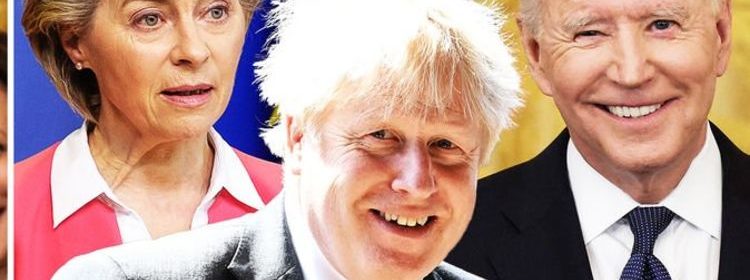Keep dreaming, Brussels! Desperate Biden charm offensive to fail – US ‘doesn’t need’ EU

Biden: Expert warns vaccine promise ‘absolutely damaging’
When you subscribe we will use the information you provide to send you these newsletters. Sometimes they’ll include recommendations for other related newsletters or services we offer. Our Privacy Notice explains more about how we use your data, and your rights. You can unsubscribe at any time.
After Britons’ decision to leave the EU, Brussels has lost an important diplomatic voice at the negotiating table when it comes to its relationship with America. Despite relations between the bloc and the US improving after the election of President Joe Biden, bilateral relationships between individual member states and the US are still far from achieving the type of partnership enjoyed by the UK.
According to Ester Sabatino, an expert on EU defence cooperation, even major countries in the bloc like France, Germany and Italy are far from reaching this achievement.
Speaking to Express.co.uk, the defence and security researcher at the International Affairs Institute, argued Germany does not share the same understanding of security and defence matters as the US. Italy, on the other hand, is culturally closer to its American allies, but lacks political stability for such a relationship to bilaterally flourish, she added.
Ms Sabatino said: “I don’t see it coming, let’s say anytime soon. But of course, in the midterm, this should be some kind of, if not a special relationship, a kind of relationship that probably has to bring a US-view inside the EU.
“Not that the US needs that because of course they are, they’re considered to be the most powerful country in the world.
“But probably a share of commonalities is something that is going to happen.”
Asked to predict which country in the EU has more chances to advance in a bilateral relationship with the US of the likes of the one the UK enjoys with its transatlantic partners, she said: “When it comes to countries, I really don’t know.
“Because, for example, Germany has a kind of different strategic culture.
“It’s more precautionary in its approach to security and defence.
“While other countries like Italy and France share a more similar view also on engagement and on foreign policy.
READ MORE: Fishing SELL-OUT: New data exposes extent of Brexit stitch-up
“But we all know the relationship between France and the US.
“And I don’t know that Italy is ever going to have the political weight to establish this kind of relationship.
“Of course, from, from my point of view, I am an Italian so this is something that I would really like to see happen.
“But, of course, in order to reach that one needs political willingness and determination.
DON’T MISS:
Brexit LIVE: Boris ignores Gove’s plea in crucial vote on trade deal [LIVE BLOG]
Nexit now! EU urged to ‘apologise’ as Dutch exports to UK soar [INSIGHT]
Von der Leyen delivers bitter swipe at UK ahead of G20 health summit [ANALYSIS]
“And the political landscape in Italy is sometimes presumed unstable, and in order to have this kind of relationship our stability in the political field is needed.”
Asked to elaborate on Germany’s position, given its political stability overall, Ms Sabatino said: “Germany is not lacking an understanding of security and defence, I just believe that it is different to the one in the US.
“This is not going necessary to not letting Germany become this kind of strategic partner for the US.
“But I think that in order to have a special relationship, also a shared understanding of the strategic culture and security and defence is something that is important to have.”
The EU and the Biden administration have recently been locking horns on ways to ensure less developed countries across the world have access to a fair share of COVID-19 vaccines to fight the pandemic at the same pace as the rest of the world.
President Biden earlier in May backed calls from many developing countries for a waiver of patents for COVID-19 vaccines, in the hope that would boost production and allow for a more equitable distribution of shots across the globe.
However, the draft final declaration does not mention such a mechanism, which has been contested by some European nations, who have instead called for the removal of US trade barriers that they consider the main bottleneck preventing a ramping up of vaccine production.
Looking to broaden supply chains, Europe has instead announced during a G20 meeting in Rome that it will set up at least three manufacturing hubs in Africa this year to boost long-term production of vaccines.
According to an EU official, drugmakers including Pfizer and BioNTech would announce large supplies of at-cost COVID-19 vaccines to poor nations to try to redress a global imbalance.
Source: Read Full Article



